
Jul 24, 2025

The new report on the Global Calibration Management Software Market, released by Metastat Insight, is a thorough examination of the industry's existing dynamics and future trajectory. This in-depth research offers a complex description of how calibration management software keeps evolving operational efficiencies across different industries while, at the same time, adjusting to the unique requirements of highly dependent industries with respect to precision and compliance. In place of generalized overview, this investigation provides a considerate examination of the subtle changes taking place in this specialist area. Calibration management software has increasingly found its place in the limelight as businesses ramp up their emphasis on precision, traceability, and compliance.
Global Calibration Management Software market is estimated to reach $378.14 million in 2025 with a CAGR of 5.4% from 2025 to 2032.
Pharmaceuticals to manufacturing industries now look beyond operational necessity and focus on the integrity and traceability of their equipment's performance. This increased focus has pushed the software to a place of greater importance, making sure that the solutions offered are as adaptive and resistant to industry-specific needs as possible. Such software solutions, as opposed to being static, are continuously perfected to suit the more complex requirements being placed on modern industries. The development of calibration management software is not an isolated process from the overall drive of digital transformation. As businesses look to streamline their internal operations with technology implementation, the function of calibration management software has changed.
No longer limited to cumbersome manual record-keeping or stand-alone databases, the systems now operate as part of integrated components of broader digital ecosystems. They play a direct role in enhancing transparency and accountability, creating environments where data integrity takes center stage. This change has been less about technological innovation and more about solutions to specific organizational pain points that are strong and scalable. What characterizes this market is its correlation with sector-specific regulatory mandates. Where compliance is not a nicety but an absolute necessity within an industry, the imperative for solid calibration management becomes acute. Software solutions in this space have been developed with extensive knowledge of these regulatory environments, such that the users are able to address audit needs without placing an undue burden on their internal resources.
In addition, these solutions enable the harmonization of calibration operations at geographically distributed sites, providing a single approach which reduces inconsistencies and improves operational consistency. The Global Calibration Management Software Market is further extending its reach through integration with other company systems. This integration guarantees that calibration information funnels correctly into larger quality management or enterprise resource planning solutions. The advantage is double-fold: it minimizes the possibility of data silos while at the same time improving the reliability of organizational reporting. Companies using these bundled systems cite easier audits, less compliance problems, and increased general confidence in their operational data.
These advancements indicate that calibration management software is more than a single packaged solution but part of the larger enterprise technology infrastructure. Increased interest in this market comes from changing attitudes toward data security and privacy. As calibration information becomes increasingly digitized and networked, fears over unauthorized access and data breaches have increased. Software companies in this sector have countered this by integrating advanced levels of security into their products, keeping important information secure but easily accessible to those with the proper clearances. This balance between security and accessibility demonstrates a sophisticated awareness of the organizational requirements of today and addresses the flexibility that exists in the software products. Another aspect that needs to be highlighted is the growing need for customization and flexibility.
Organizations are no longer satisfied with solutions that fit a single mold. They are looking for software that can be modified to suit their individual workflows, reporting hierarchies, and operational idiosyncrasies. This need has prompted innovation in the marketplace, resulting in solutions that provide modular capabilities and configurable elements. This flexibility not only increases customer satisfaction but also maximizes business return on investment when these tools are deployed. It is a testament to increasing awareness among providers of the importance of delivering real value through solutions that map exactly to client needs.
Globalization has also had a definitive impact on this market's direction. Businesses operating in numerous regions need software that can accommodate many languages, standards, and regulatory requirements. Calibration management software has adapted to address these needs by providing flexible platforms that can be installed internationally without compromising local compliance requirements. This generality increases the attractiveness of these solutions for multinational companies, making them an even deeper part of the operational threads of global businesses. Behind these trends is a wider change in the way organizations view calibration management as a function. From a necessary but routine component of operations, it is now viewed as a strategic function that can impact wider quality outcomes and operational excellence.
The software underlying this function has thus been upgraded in significance, gaining more attention from decision-makers looking to maximize every edge in sustaining competitive advantages. The Global Calibration Management Software Market has therefore emerged as a key component within the operational strategies of organizations that desire accuracy, compliance, and efficiency. As articulated in the recent findings presented by Metastat Insight, this market is characterized by an advanced combination of technology, regulation, and organizational need. It keeps on shaping itself according to these forces and providing solutions that not only fulfill current demands but are also ready to adjust to prospective challenges. The ongoing development and optimization of calibration management software reflect its continued relevance and increasing strategic importance in modern business environments.
Drop us an email at:
Call us on:
+1 214 613 5758
+91 73850 57479